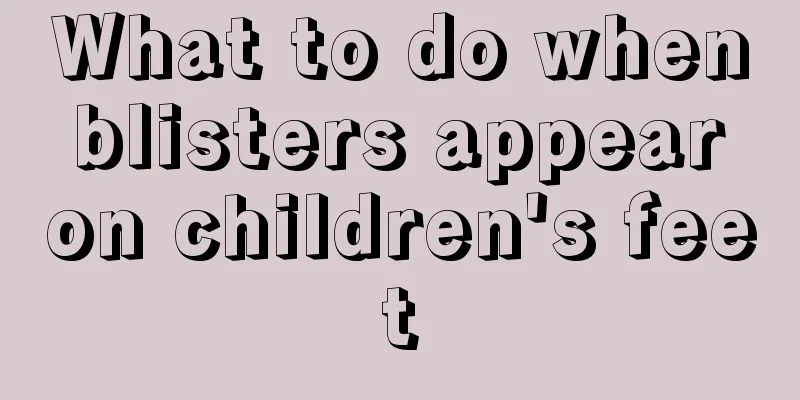Symptoms of colic in two-month-old babies

|
Many people think that only adults have colic problems, but in fact, babies who are just two months old can also experience colic. Although this is not a serious disease, once it occurs it will still have a great impact on the patient's body and mind. Babies within a few months will not express their physical symptoms themselves, so if infants and young children have colic problems, what are the symptoms? Infant colic Some pediatricians define infantile colic as crying for at least 3 hours a day, at least 3 days a week, for more than 3 weeks in a healthy, well-nourished infant. So moms and dads don’t need to worry too much. After all, colic is not a disease, but it is still quite heartbreaking. It is understood that about 20% of babies will experience colic, usually starting when they are 2 to 4 weeks old. This type of colic is common regardless of whether the baby is the first or not, whether it is a boy or a girl, and whether the baby is breastfed or formula-fed. Fortunately, baby colic will not last forever. 60% of babies will get better by about 3 months, and 90% of babies will feel much better by 4 months. Symptoms of colic in babies Speaking of the characteristics of baby colic, it is very similar to intussusception, and both will cause intermittent crying. The difference is that colic will not cause vomiting or the passage of mucus containing blood in the stool. When babies have colic, they often scream suddenly, and sometimes cry so hard that their faces and necks turn red and thick. Some babies may also experience shaking heads and slightly rapid breathing. When a baby has colic, his or her belly will be a little bloated, his or her hands will be clenched, and his or her feet will be straightened or bent. If you touch his or her hands or feet, they will feel cold. In fact, the baby's crying may be the most obvious sign of colic. The crying can last for minutes or even hours. Even if the mother coaxes and holds the baby, the baby will remain indifferent. In fact, the little guy is also quite tired because no one understands his pain. What’s even cuter is that after the baby poops or farts, the colic will be relieved, but it will scare the mother. Causes of colic in babies In fact, baby colic is a mystery, and the medical community has not given a direct explanation. However, some experts speculate that the cause of infant colic may be constipation, bloating, diarrhea or milk allergy. 1. The small belly sucks in too much air. When babies are hungry or too full, they will cry. The action of crying may cause them to inhale too much air, so their little stomach will bulge. This feeling is extremely uncomfortable, so babies will start to cry. 2. Indigestion. The baby's stomach and intestines are still quite weak. There are not enough digestive enzymes and digestive juices in the digestive tract to break down food, especially amylase. The breast milk or formula milk that babies drink every day are difficult to digest. After all, they are high in protein. At this time, the baby may experience colic due to indigestion. 3. Psychological factors. Babies also have their own little emotions, such as anxiety, anger or nervousness. In fact, they are still emotionally unstable little guys. When their little emotions have nowhere to vent, babies are prone to colic. 4. The individual's physique is sensitive. Some babies will not feel uncomfortable even if they have bloating, but some babies have more sensitive constitutions, so their reactions will be more intense, resulting in colic. How to relieve infant colic When your baby has colic, how should you relieve it? Daddy and mommy Mark 4 tips! 1. Massage your abdomen. The baby keeps crying, which makes mothers feel heartbroken. At this time, it is recommended that mothers massage the baby's abdomen, or use a lubricated rectal thermometer to repeatedly stimulate the baby's anus to help the little ones expel gas. 2. Breastfeed as much as possible. Studies have shown that babies who drink breast milk are less likely to suffer from colic. In addition, breastfeeding mothers should also pay attention to not eating spicy and irritating foods, stay away from caffeinated beverages, and eat less raw and cold foods, otherwise the baby may be unwilling to drink milk. 3. Comfort the baby. Take care of your baby comfortably, and he will be a handsome man quietly. Moms can wrap their babies in a bath towel, but not too tight. You can also massage your baby's back, but be gentle! 4. Create a quiet environment. If the baby's room is too noisy, it may cause dissatisfaction to them. Remember to give them "private space" and let the baby rest in a quiet environment. How to care for infant colic Infant colic is a very special disease because the cause of the disease has not been found yet. When the baby has colic, the mother will not be able to breastfeed happily. The baby will cry at night and fall asleep during the period, but will suddenly wake up crying again after a while, which makes parents very worried. How should you care for your baby when he or she has colic? 1. Feed the baby. Mothers can breastfeed their babies, which can calm the babies down. Breastfeeding can also prevent babies from being allergic to milk. 2. Gently massage your baby's abdomen. You can now apply a layer of moisturizer or baby oil on your hands, and then gently rub your baby's tummy in a clockwise direction. 3. Wrap your baby. If necessary, you can wrap the baby up. This can calm the baby and make the little one feel safe. 4. Rock your baby gently. Put the baby on your lap and rock him gently. The little guy will think you are teasing him and his mood will naturally improve. 5. Pay attention to your sleeping posture. When your baby is sleeping, you can use a side sleeping pillow to keep the baby in a side-lying position. This sleeping position can relieve the baby's abdominal pain. |
<<: What’s wrong with the child who is dazed and absent-minded?
>>: How to treat typical absence seizures in children?
Recommend
What to do if your baby has watery diarrhea
The seasons are changing very quickly now and one...
What are the reasons why a one and a half year old baby cries in the middle of the night?
Babies will show different states at different ag...
Children's hair style
Children all like to dress themselves up beautifu...
Treatment of nasal congestion in one-year-old babies
The nasal cavity of a baby is not well developed ...
What should I do if my child has a severe picky eater?
Many times, our parents' concept about childr...
What is the normal heart rate for children?
Children's heart rate is slightly faster than...
Weight loss method for children aged 9 years
The body of a nine-year-old child is in the begin...
What is the cause of neonatal hemangioma?
Hemangioma is a common benign tumor of the skin b...
What should I do if I have received intravenous drip for roseola infantum?
Many babies have suffered from roseola infantum. ...
What to do if your child has a fever of 395 degrees
When a child has a fever of around 39.5 degrees, ...
Precautions for children with epiphyseal damage
When children are young, they tend to be more act...
Psychological aspects of nervous system development in preschool children
The development of the nervous system is directly...
What to do if a child coughs in the morning
Many parents must have encountered situations whe...
Is it a problem if my baby has a fever of 37 degrees?
Nowadays, every child is the apple of the eye of ...
What causes nausea and retching in newborns?
If a newborn baby experiences nausea and retching...









